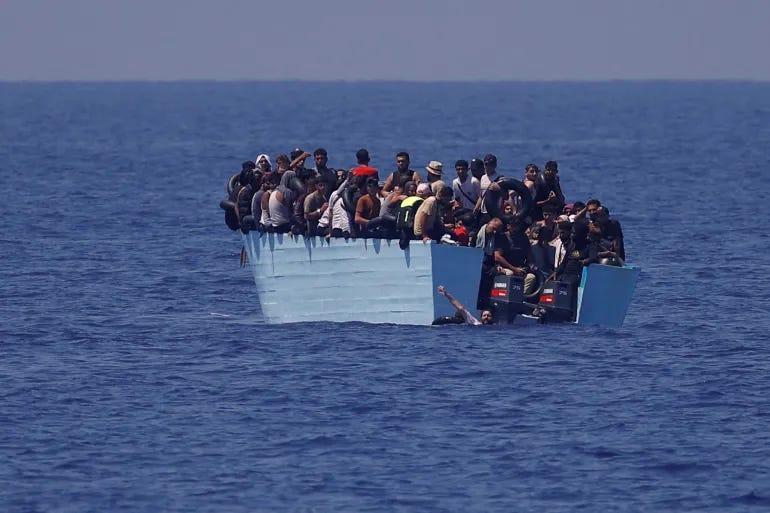Tragedy in the Mediterranean: Why Are Pakistanis Still Taking Deadly Routes to Europe?
Even those with financial stability are risking their lives for a better future—but at what cost?
Islamabad, Pakistan – Rehan Aslam had a comfortable life. His family ran a successful transport and car rental business, alongside grocery stores. Yet, five months ago, the 34-year-old father of three sold his Toyota Hiace wagon for 4.5 million rupees ($16,000) to finance his journey to Europe. He never made it.
Rehan was among 86 people who boarded a boat from Nouakchott, Mauritania, on January 2, attempting to reach Spain’s Canary Islands. After being stranded at sea for over 13 days, Moroccan authorities rescued the vessel—only 36 people survived. Among the 65 Pakistanis on board, 43 perished, including Rehan.
“He just wanted a better future for his children,” said his brother, Mian Ikram Aslam. “He asked us not to stop him.”
Pakistan’s Ministry of Foreign Affairs has pledged to repatriate the 22 survivors, but for the families of the deceased, the tragedy has left lingering questions: What happened on that boat? Why were these men taking an unfamiliar and perilous route? And why are even financially stable Pakistanis willing to risk everything for Europe?
Violence and Unanswered Questions
This latest disaster follows a series of deadly Mediterranean crossings. In December alone, four vessels sank, killing nearly 50 people, including at least 40 Pakistanis. The worst shipwreck in recent memory occurred in June 2023, when the Adriana capsized near Greece, claiming over 700 lives—300 of them Pakistani.
Initially, Pakistan’s Foreign Ministry reported that the recent boat had “capsized” near Dakhla, a Moroccan-controlled territory in Western Sahara. But survivors’ families allege a far more horrific fate: their loved ones were beaten and tortured before being thrown overboard.
“They were attacked by pirates who stole their belongings, assaulted them with hammers, and tossed some into the sea,” said Aslam, citing accounts from survivors.
Businessman Chaudhry Ahsan Gorsi, who lost two nephews in the tragedy, was similarly horrified. “These boys sold their land to pay for the journey. I never imagined they’d be tortured to death,” he said.
Pakistan has sent an investigation team to Morocco, but their findings remain undisclosed. “We are still gathering details from survivors,” said acting Ambassador Rabia Kasuri.
A Shift in Migration Routes
The districts of Gujrat, Sialkot, Jhelum, and Mandi Bahauddin in Punjab have long been hubs of migration to Europe. Traditionally, Pakistanis took land routes through Iran and Turkey or flew to the UAE before heading to Libya and crossing the Mediterranean.
However, increasing crackdowns by the European border agency Frontex and Pakistani authorities have pushed smugglers to explore new routes. This shift explains why Pakistanis are now attempting the Western Mediterranean passage via West Africa—a dangerous, unfamiliar path.
According to the UNHCR, nearly 200,000 people crossed into Europe via the Mediterranean in 2024, with 2,824 declared dead or missing. But Frontex reports a 38% decline in irregular border crossings, with Pakistani arrivals dropping by half from 2023 to 2024.
Yet, as authorities tighten restrictions, smugglers adapt. “It’s a cat-and-mouse game,” said Munir Masood Marath, a senior official at Pakistan’s Federal Investigation Agency. “As we block old routes, they find new ones.”
Rehan’s own journey took him from Faisalabad to Dubai, then Addis Ababa, Ethiopia, before reaching Dakar, Senegal. From there, smugglers transported him by road to Mauritania, where he boarded the ill-fated boat.
Beyond Economics: The Social Pull of Migration
While poverty drives many to risk their lives, some migrants—like Rehan—come from financially stable families. The real motivation, experts say, is often social mobility.
“In our villages, people see neighbors who have moved to Europe flaunting their wealth and success,” said Aslam. “That fuels the desire to leave, even for those who are doing well at home.”
Even Gorsi, despite losing his nephews, acknowledged this lure. “They see Europe as a place where they can build a future, free from corruption and daily struggles.”
For Aslam, the pain of losing his brother is undeniable, but so is his understanding of Rehan’s choice. “He knew the risks. And we, despite our fears, let him go.”
As the bodies of the latest victims return home, Pakistanis continue to grapple with a grim reality: desperate for better opportunities, more will follow in their footsteps—no matter the cost.


